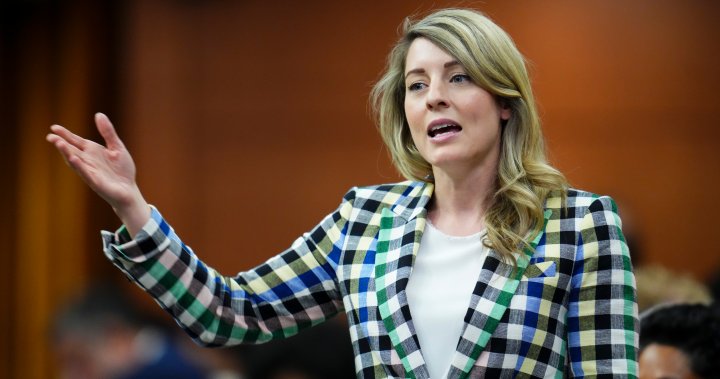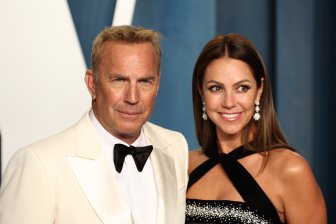Canada opts to boost Haiti police over any military intervention – National | Globalnews.ca
Canada will soon co-ordinate efforts by multiple countries to restore Haiti’s embattled police force, as neighbouring states say they have hope the Caribbean nation can overcome a severe political and humanitarian crisis.
“The situation on the ground is extremely fragile and the needs are immense,” Foreign Affairs Minister Melanie Joly said Thursday morning.
“They go beyond Canada’s or any country’s capacity to address them alone.”
She was speaking at a virtual meeting she convened with her counterparts in countries that included Haiti, the U.S. and Jamaica, as well as a senior United Nations official. Those representatives sidestepped a months-long debate over military intervention to focus on reinforcing the Haitian National Police.

Violent gangs have filled a power vacuum since the 2021 assassination of president Jovenel Moise, blockading fuel and main roads and committing brazen acts of sexual violence as gang disputes over territory creep beyond the capital of Port-au-Prince.
Last fall, the unelected Prime Minister Ariel Henry asked for a military intervention to clear out the gangs and allow for humanitarian aid, in the hopes of stopping a cholera outbreak. The UN and Washington continue to support the idea, but neither wants to lead such a force.
After heavy pressure to take on such a mission, Prime Minister Justin Trudeau said such a move could lead to further instability, and has argued instead for Haitians to broker a “consensus” around what kind of help they are seeking from western countries.
The Canadian approach has been to sanction political and economic elites that Ottawa alleges have supported the gangs, a method the U.S. has embraced with less fervour and that European and Caribbean peers have largely avoided.
Canada is adding two former politicians to its list of sanctioned Haitian elites, bringing the total to 21 people. The newly sanctioned politicians are Gracia Delva and Prophane Victor.
Joly says she is hoping other countries step up their own sanctions efforts, instead of relying on a global UN list that has so far recommended just one person for sanction, last October.
“Our message of zero tolerance for corruption and impunity will be much stronger together,” Joly told her counterparts in French.
“We thank our partners in this fight — and we urge you all to join us.”

Joly also announced $13 million for law enforcement and development in Haiti, with a focus on drugs and anti-corruption activities.
She said it is key that countries put an emphasis on the work of the Haitian National Police, in order to stop a culture of impunity at “a pivotal moment” for the country.
To that end, Ottawa is launching a “co-ordination cell” this summer to assess Haiti’s needs, such as training and equipment, and to figure out how supporting countries can meet those requests.
That will involve a Canadian presence in the neighbouring Dominican Republic and eventually in Port-au-Prince, despite Global Affairs Canada warning citizens to “avoid all travel” to Haiti because of kidnappings in the city.
The UN representative in the country noted that recent earthquakes and floods have worsened instability, hunger and a cholera outbreak.
Maria Isabel Salvador said police can currently only temporarily contain situations and have no hope of constraining gang activity without much more funding.
However, following concerns from civil society that Henry has not been willing to cede enough power, Salvador praised Henry for his “openness in forming consensus, including concessions to the ministerial cabinet.”
Haiti’s Foreign Affairs Minister Jean Victor Geneus said he hopes Haitians will move past political disagreements and embrace the country’s plans for a transitional council.
The move has been rejected by certain influential groups who refuse to participate if Henry does not leave office.
“We are in the presence of a boiling mixture, ready to explode at the slightest spark,” Geneus said in French.
“The government hopes that Haitian political actors will come to understand the urgency of the moment, and to put aside their ego to prioritize the collective interest, in order to definitively get the country out of the zone of turbulence and despair.”

Jamaican Foreign Affairs Minister Kamina Johnson Smith praised efforts funded by Canada and the U.S. to get 50 prominent Haitians to meet in Jamaica to carve out a political solution to the crisis.
She said Caribbean leaders helped broker some momentum, with Haitians outlining “interim governance measures needed to restore confidence in the transition” and hold “credible general elections.”
Johnson Smith said there is “widespread stakeholder support” for changes to the structure of government in the interim, and Henry has now agreed for more representation on a transitional council.
Still, she warned that Haiti might still need an international military intervention.
Washington and Caribbean countries have expressed fears that the humanitarian and gang crisis in Haiti will lead to even more refugees and guns spreading across the region.
© 2023 The Canadian Press
For all the latest world News Click Here




